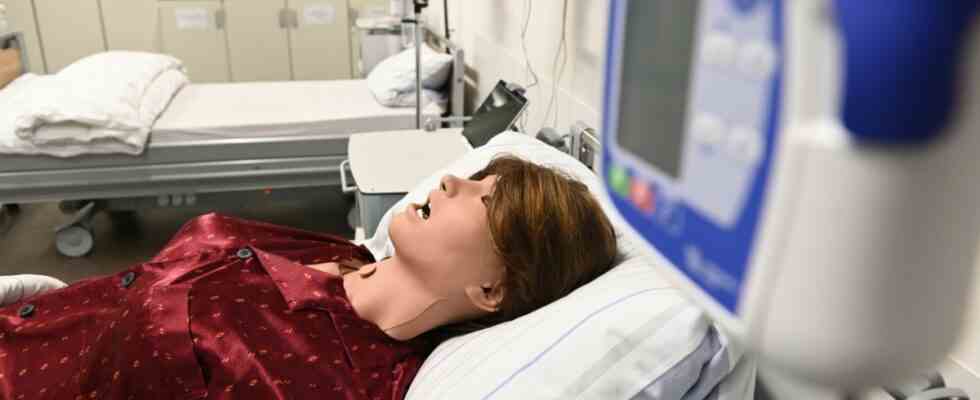Helena is in the hospital bed. In beautiful burgundy pajamas. Dressed a bit warm for the summer temperatures outside, but Helena doesn’t care. She is a simulation patient, a high-tech doll that can talk. And that’s what she does: “Hello,” she says. A little tinny, a little artificial.
Helena is in the Skills Lab, as the modern simulation room is called Evangelical Nursing Academy – one of six nursing schools in Munich – opened last week. 234 students are being trained as nursing staff at the vocational school in Sendling, which belongs to the “Hilfe im Alter GmbH” of the Munich Diakonie. And they will all pay Helena frequent visits, will learn hands-on how to measure blood pressure, perform cardiac massages or insert catheters, among other things. A camera captures everything, the care educators can follow everything on the screen, give instructions and even control Helena.
Expects a lot from Skills Lab: the deputy headmistress Antje Krömeke.
(Photo: Stephan Rumpf)
The school now has four settings available. In different rooms there are beds in the areas of inpatient acute and intensive care, inpatient long-term care, paediatrics, i.e. child and infant care, and outpatient care. Each area is set up accordingly. Another unnamed doll has a wedding picture on the bedside table and a picture of the family hangs on the wall. It is in the area of long-term care. Everything should look as real as possible. Bringing reality into the classroom is the goal.
A lot of practice helps and reduces fears – also in the area of child and infant care.
(Photo: Stephan Rumpf)
Planning for the new rooms began in February 2021, reports Dirk Spohd, Managing Director of Hilfe im Alter GmbH. And we are very happy that the city of Munich has funded the Skills Lab with 150,000 euros. Because he and the deputy headmistress, Antje Krömeke, are convinced that the quality of the training will improve with the simulation rooms. “The prospective nurses not only gain practical experience, they also learn to perceive and reflect on themselves better,” says Spohd. And they lose the fear of suddenly working on real patients from one day to the next. In the 1970s, the skills lab concept emerged in the USA. This support for action competence came to Germany via the Netherlands as a training support.
Monitoring on the screen: In the technical room, nursing teacher Belmin Mesic can see exactly what the students are doing – and intervene via microphone.
(Photo: Stephan Rumpf)
“That’s very important,” says teacher Belmin Mesic, 33. Everyone can now try out the dolls in lessons and, says Mesic, who was a student at the nursing academy, “also make mistakes.” In the technical room, the nursing educator explains what a scene can look like, which usually lasts no longer than five minutes. The situation of the patient or Helena’s situation is explained to the student and he is given a clear task. For example, to check the vital functions closely.
The camera records the scene, the students in the classroom follow it on the screen. The teacher in the technical room can give instructions that control the functions of the puppet. “Sometimes,” says the 33-year-old, “the situation is different.” Suddenly Helena has to be intubated. Acute shortness of breath. Then the scene is discussed with all the students. By the way, none of the data gets out. Anything recorded is for practice purposes only and will be erased.
“Am I going to die?” is heard through the microphone. This time the voice is real. One student has lain down on the hospital bed in the acute residential care setting for demonstration purposes, another is a nurse and is examining her. The patient has a headache. She is dizzy and her ears are buzzing. The blood pressure is measured. Friendly, but determined, the nurse conducts research. “Did you take your pills too?” she asks at some point. “Oh, no,” says the patient.
In the “horror room” the students have to identify sources of error: This catheter bag is not hanging properly. It should hang below the bladder when sitting or lying down.
(Photo: Stephan Rumpf)
And there is one more room. An additional unit that teachers and students call the “Horror Room”. Pretty much everything is wrong with this exercise. The patient lies in dirty bedding, a pill, gloves and needles lie on the floor. The catheter bag is completely wrong and the commode bowl is not emptied. “In this case, urine is apple juice,” explains teacher Alois Geisperger with a smile. He has been at the school since 2017 and hopes that the trainees will recognize all the sources of error the next day.
Training to become a nurse takes three years. Helena and her colleagues will also play a role in the exams in the future. Skills Lab trainer Gabriele Altherr says they are currently considering how the simulation units can be “well integrated” into the school’s examination regulations.

